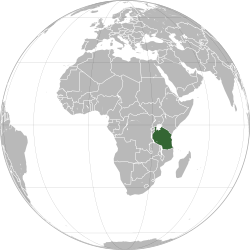Global WikiEducation Initiative
| Learn together, grow together | |
|---|---|
 Tanzania | |
| Location | Tanzania |
| Country code | TZ |
| Official language(s) | Swahili, English |
| @global_wikieducation | |
Mission
[edit]Empowering global communities through equitable access to quality education and contents, the promotion of open knowledge, and the cultivation of collaborative learning environments. With a specific focus on Tanzania, the Global WikiEducation Initiative envisions a world where individuals, regardless of their background or location, have the opportunity to actively participate in the creation and dissemination of free knowledge.
Our mission is to foster cultural diversity, digital literacy, and lifelong learning, ensuring that Tanzanian communities are at the forefront of the global movement towards accessible and inclusive education. The Initiative is also responsible for coordinating our previous Kiwix4schools project in Tanzania.
We actively collaborate with various Wikimedia Educational movements, local communities in the essence of fostering impactful partnerships and driving meaningful contributions across a spectrum of projects.
Objectives
[edit]- Empowering Underserved Communities:
- Increase access to quality education globally, particularly for disadvantaged populations. This includes fostering inclusivity and offering resources in multiple languages.
- Open Knowledge for All:
- Advocate for the use of open knowledge, showcasing Wikimedia projects as valuable educational tools. Integrate these projects into various educational settings, both formal and informal.
- Global Collaboration & Skills:
- Facilitate partnerships and collaborations between educational institutions, organizations, and communities worldwide. Develop and implement programs to enhance digital literacy skills for learners of all ages, providing training resources for educators and learners to effectively utilize Wikimedia projects.
- Promoting Gender Equity:
- We are committed to addressing gender disparities by promoting inclusive participation and representation in open knowledge and Wikimedia projects. Through targeted outreach, mentorship, and supportive community environments, we aim to ensure equitable contributions from all genders and enhance the diversity of content across our platforms.
- Active Participation on Wiki Programs:
- Encourage and facilitate direct participation in Wikimedia projects (Wikipedia, Commons, etc.) as both contributors and consumers of knowledge, fostering a culture of open collaboration and learning.
Activities
[edit]
1. Kiwix4Schools Program The Kiwix4Schools program empowers students in under-resourced schools with offline access to knowledge. To achieve this, we conduct Kiwix Workshops where our team of volunteers first undergo technical training to ensure they can confidently install and manage the Kiwix software. Following this, the program transitions to hands-on learning. We then visit schools, working directly with students and teachers. Our team installs Kiwix, guiding students through its functionalities and training teachers on how to integrate this valuable resource into their curriculum. This comprehensive approach ensures a smooth transition for schools as they bridge the digital divide and unlock a world of educational opportunities.
2. Edit-a-thons:
Edit-a-thons are like workshops where people work together to edit and improve Wikipedia articles,Wikidata items or any other Wikimedia projects on a particular subject. These events are open to everyone, from beginners to experienced editors. They provide a supportive environment for sharing knowledge and adding content to Wikipedia or Wikidata or any other Wikimedia projects on interesting topics like local history, cultural aspects, or important people. Often, there are even training sessions to teach participants how to edit effectively and follow the best practices for contributing to these online information sources.
3. Photowalks:
Photowalks are like outdoor photography events that combine learning with contributing to open knowledge. Participants, equipped with cameras or smartphones, embark on guided tours focused on capturing images of their surroundings while also exploring educational themes. These themes can be anything from specific campaigns (Wiki Loves Africa, Folklore, Monuments) to educational topics related to the location itself (architecture, wildlife, local history). The captured photos are then uploaded to Wikimedia Commons, a free image library. These pictures can be used to illustrate Wikipedia articles or provide visual documentation of cultural, historical, or natural aspects of a region. Photowalks not only contribute valuable images to open knowledge resources but also allow participants to connect more deeply with the educational aspects of their surroundings and the subjects they photograph.

4. Community Meetups:
Community meetups are like social events for people who share a passion for open knowledge. These gatherings provide a space for members to connect, exchange ideas, and work together on projects. Meetups are crucial for building a strong and supportive community around open knowledge. They offer a platform to brainstorm new initiatives, discuss challenges faced by the movement, and celebrate achievements. Often, these meetups lead to the development of strategies and partnerships that propel the open knowledge movement forward.
Join hands with us
[edit]All individuals interested in joining the project are all welcomed!

